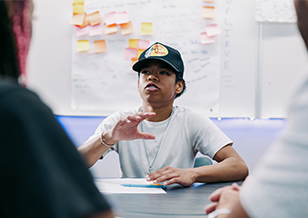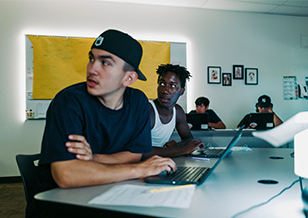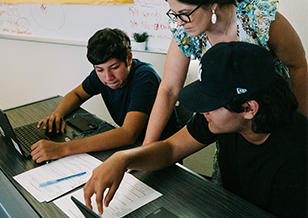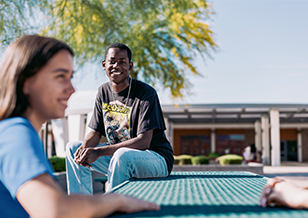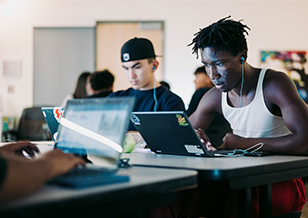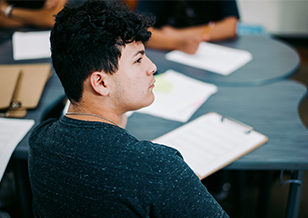Skills for Success Digital Lessons
The Skills for Success digital lessons help students build essential communication, collaboration, and growth mindset skills through interactive activities and real-world reflection. Lessons cover topics like effective listening, collaboration across cultures, negotiation strategies, embracing failure, developing a growth mindset, and challenging common myths like multitasking. Each lesson below contains the Facilitator Guide resource provides the details and necessary preparation to enable users to complete the lesson. The .zip file contains the SCORM driver and content to be uploaded into a Learning Management System.
NOTE: If you use Google Classroom or another LMS that does not support SCORM, please access the digital lesson for the students through the link provided in each lesson description.
Skills for Success Virtual Lessons Unit Overview as well as Instructions for using SCORM files with Canvas and Blackboard and the list of external links to be whitelisted by lesson for this collection.
This resource is free to use, adapt, and share for non-commercial purposes with credit to Center for the Future of Arizona. Please review and follow our full Terms of Use.
In this lesson, students will participate in a series of activities that promote effective communication.
NOTE: If you use Google Classroom or another LMS that does not support SCORM, please access the digital lesson for the students through the link provided directly here: https://rise.articulate.com/share/jX0m6UWnWGrO6TGBU7su0YtWmCrOkGTp
This resource is free to use, adapt, and share for non-commercial purposes with credit to Center for the Future of Arizona. Please review and follow our full Terms of Use.
In this lesson, students will review and practice principles of Listening First to Understand. First, they will learn about the Habits of Highly Successful People, one of which is “Seek First to Understand, Then to Be Understood.”
NOTE: If you use Google Classroom or another LMS that does not support SCORM, please access the digital lesson for the students through the link provided directly here: https://rise.articulate.com/share/Mxe3Sbn9HL3sedPbiTiGPGAZFyCGXJgv
This resource is free to use, adapt, and share for non-commercial purposes with credit to Center for the Future of Arizona. Please review and follow our full Terms of Use.
In this lesson, students will identify bridges and barriers that commonly occur in communication. Students will watch two short clips and look for things that form connections or things that form obstacles to effective communication.
NOTE: If you use Google Classroom or another LMS that does not support SCORM, please access the digital lesson for the students through the link provided directly here: https://rise.articulate.com/share/2V8fod8kQtSCcH5lRKDQC4VlCCBn4wb_
This resource is free to use, adapt, and share for non-commercial purposes with credit to Center for the Future of Arizona. Please review and follow our full Terms of Use.
This lesson provides students with an introduction to the importance of strong communication skills. They will begin by examining some mystery data. They will then check off the importance of basic communication skills and better understand their claims.
NOTE: If you use Google Classroom or another LMS that does not support SCORM, please access the digital lesson for the students through the link provided directly here: https://rise.articulate.com/share/KzGKm-5SCWyqZsgzo41ZDZmDQurz_-5e
This resource is free to use, adapt, and share for non-commercial purposes with credit to Center for the Future of Arizona. Please review and follow our full Terms of Use.
In the lesson: Operation Communication, students will develop an understanding of behaviors that contribute to collaborative communication.
NOTE: If you use Google Classroom or another LMS that does not support SCORM, please access the digital lesson for the students through the link provided directly here: https://rise.articulate.com/share/qjuPQuG7ZPVST_qn_4tCxwFjZr3pXjcT
This resource is free to use, adapt, and share for non-commercial purposes with credit to Center for the Future of Arizona. Please review and follow our full Terms of Use.
In the lesson: Five Pillars of Effective Communication, students will get to reflect on what makes collaboration effective or ineffective. What can be learned from collaboration successes and challenges? How can one work toward positive collaboration? The students will also learn about the five pillars of effective collaboration and apply this new knowledge to thinking about how to improve their own collaboration skills.
NOTE: If you use Google Classroom or another LMS that does not support SCORM, please access the digital lesson for the students through the link provided directly here: https://rise.articulate.com/share/l4GbIH-1UKGJQoFa6HW3QqN4_p-R1Uue
This resource is free to use, adapt, and share for non-commercial purposes with credit to Center for the Future of Arizona. Please review and follow our full Terms of Use.
The lesson: Collaboration Across Cultures, introduces a framework for thinking about culture and cultural differences that is not judgmental or value-laden. Students think about the terms they might use when describing a culture that is different from their own and the profound cultural differences in communication and entry points for considering some of the dimensions of other cultures.
NOTE: If you use Google Classroom or another LMS that does not support SCORM, please access the digital lesson for the students through the link provided directly here: https://rise.articulate.com/share/3vFXft1fybalX12IityCvp967FDReryo
This resource is free to use, adapt, and share for non-commercial purposes with credit to Center for the Future of Arizona. Please review and follow our full Terms of Use.
In the lesson: The Win-Win Approach, students will use problem-solving skills to negotiate win-win resolutions for everyone. This lesson begins with a reflection on social deposits or withdrawals—adding or subtracting from trust and goodwill. Next, they will learn about the four different types of negotiation outcomes: (a) win-lose, (b) lose-win, (c) lose-lose, and (d) win-win.
NOTE: If you use Google Classroom or another LMS that does not support SCORM, please access the digital lesson for the students through the link provided directly here: https://rise.articulate.com/share/XKWCP7WvSW5RZmpDTKci_sbnzD4c7bCJ
This resource is free to use, adapt, and share for non-commercial purposes with credit to Center for the Future of Arizona. Please review and follow our full Terms of Use.
Failure is unavoidable, but how we view failure influences the conditions for a growth mindset or a fixed mindset. The object of this lesson is to normalize—and even celebrate—failure. In the lesson: Celebrating Failure, the concepts of perspective and reframing failure will be introduced. Students will be challenged with their understanding of failure in order to plant the seeds that success, talent, and intelligence are not fixed traits but are often the results of application, effort, and support.
NOTE: If you use Google Classroom or another LMS that does not support SCORM, please access the digital lesson for the students through the link provided directly here: https://rise.articulate.com/share/S7iXyRx6IzL5edmXGCRT6rIBIINqSRib
This resource is free to use, adapt, and share for non-commercial purposes with credit to Center for the Future of Arizona. Please review and follow our full Terms of Use.
In the lesson: The Power of Yet, students will begin by thinking about a repeated challenge/frustration in their life and identifying the accompanying internal narrative. Students will be introduced to the “power of yet” and will categorize phrases that inspire growth mindset—or encourage a fixed one. The students will learn about the Dare Dot principle and present a growth-mindset challenge.
NOTE: If you use Google Classroom or another LMS that does not support SCORM, please access the digital lesson for the students through the link provided directly here: https://rise.articulate.com/share/FON-sPQBs5qd4U6gW1haFdNtVfrzM7sR
This resource is free to use, adapt, and share for non-commercial purposes with credit to Center for the Future of Arizona. Please review and follow our full Terms of Use.
In the lesson: The Hero and the Scholar, students will learn about the development of fast and slow systems of thinking and its purpose. Students will analyze different situations to see what kind of thinking each situation provokes or supports: fast or slow. Based on their growing understanding of fast and slow thinking, the students will reflect on recent situations that may have triggered their hero or scholar brain.
NOTE: If you use Google Classroom or another LMS that does not support SCORM, please access the digital lesson for the students through the link provided directly here: https://rise.articulate.com/share/fYgBH60jDnUXEZ_kdex7CU2MwHeA_CTK
This resource is free to use, adapt, and share for non-commercial purposes with credit to Center for the Future of Arizona. Please review and follow our full Terms of Use.
In the lesson: The Myth of Multitasking, students will learn about the assumptions associated with multitasking. Students will analyze and compare multitasking and single-tasking. Based on their analysis and understanding, students will reflect on their own assumptions about multitasking.
NOTE: If you use Google Classroom or another LMS that does not support SCORM, please access the digital lesson for the students through the link provided directly here: https://rise.articulate.com/share/SA6tZcWXtijjrGV7J1zWPIbK2pdWzprz
This resource is free to use, adapt, and share for non-commercial purposes with credit to Center for the Future of Arizona. Please review and follow our full Terms of Use.

